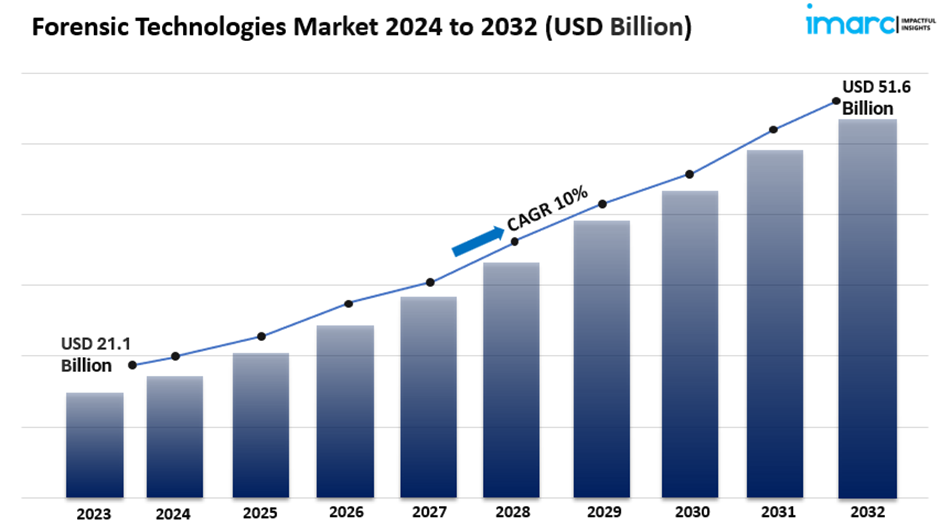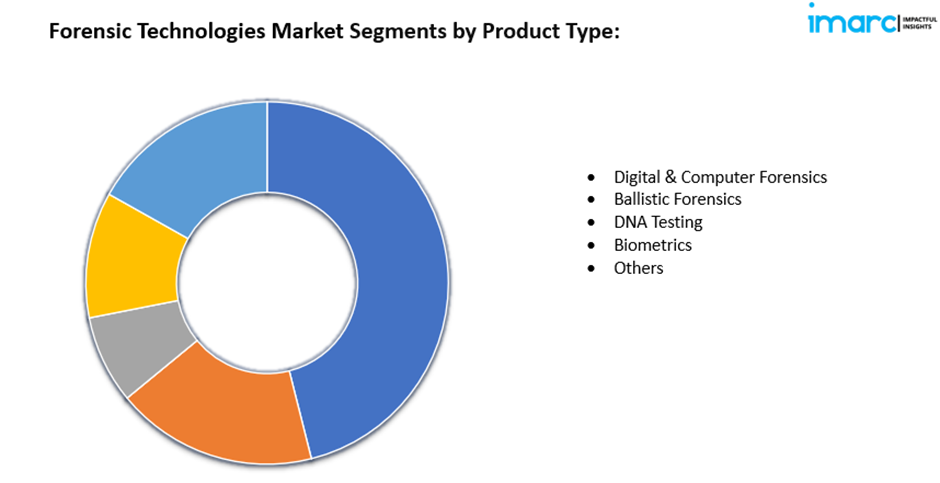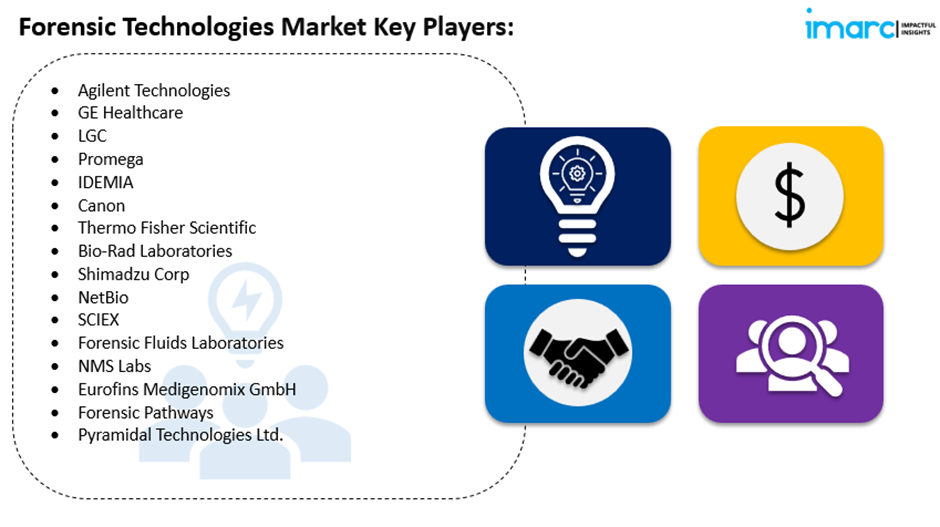Summary:
- The global forensic technologies market size reached USD 4 Billion in 2023.
- The market is expected to reach USD 6 Billion by 2032, exhibiting a growth rate (CAGR) of 10% during 2024-2032.
- By the region, the market is classified into North America, Europe, Asia Pacific, Middle East and Africa, and Latin America.
- Based on the product, the market is divided into digital & computer forensics, ballistic forensics, DNA testing, biometrics, and others.
- Based on service, the market is categorized into laboratory forensics (DNA testing, drug testing, biometrics, and others) and forensic consulting.
- By the technique, the market is classified into polymerase chain reaction (PCR), capillary electrophoresis, next-generation sequencing, rapid DNA analysis, automated liquid handling technology, microarrays, and others.
- Based on the application, the market is subdivided into pharmacogenetics, biodefense & bio-surveillance, judicial and law enforcement, and others.
- The escalating use of forensic technologies in civil cases, such as fraud detection and intellectual property protection, broadens the market scope.
- The rise of cybercrime and the need for digital evidence in cyber investigations drive the growth of digital forensics.

Request to Get the Sample Report:
https://www.imarcgroup.com/forensic-technologies-market/requestsample
Industry Trends and Drivers:
- Rising Crime Rates and Need for Efficient Criminal Investigations
The rising crime rates globally significantly impact the demand for forensic technologies. As crime becomes more complex and sophisticated, traditional investigative methods often fall short in providing conclusive evidence. Forensic technologies offer advanced solutions that enhance the capability to solve crimes, such as more accurate deoxyribonucleic acid (DNA) profiling, better fingerprint analysis, and advanced ballistic examinations. With increasing criminal activities, including violent crimes, cybercrimes, and organized crime, law enforcement agencies require more reliable and precise tools to investigate and solve cases effectively.
Forensic technologies not only help in identifying perpetrators but also in exonerating the innocent, which is crucial in maintaining justice and trust in the legal system.
- Technological Advancements in DNA Analysis and Digital Forensics
Technological advancements in deoxyribonucleic acid (DNA) analysis and digital forensics have revolutionized the field of forensic science. Modern DNA analysis techniques, such as next-generation sequencing and improved polymerase chain reaction (PCR) methods, provide higher accuracy and sensitivity in identifying genetic material. These advancements allow forensic experts to analyze degraded or minute DNA samples with greater precision, thus solving cases that were previously challenging.
Similarly, digital forensics has seen significant progress with the development of sophisticated tools to recover, analyze, and preserve digital evidence from various electronic devices. The growth of the internet and digital communications has introduced new challenges, making the ability to investigate digital evidence crucial for solving cybercrimes and other tech-related offenses.
- Growing Adoption by Law Enforcement Agencies
The growing adoption of forensic technologies by law enforcement agencies is a significant driver of the market. As crime rates rise and criminal activities become more intricate, law enforcement agencies globally are increasingly recognizing the value of forensic technologies in solving cases. These tools provide a scientific approach to evidence collection and analysis, which is essential for accurate investigations and judicial outcomes. Law enforcement agencies are investing in state-of-the-art forensic equipment and software to enhance their investigative capabilities and streamline case workflows.
The integration of forensic technologies enables more efficient processing of evidence, reduces human error, and improves the overall accuracy of criminal investigations.
Forensic Technologies Market Report Segmentation:
Breakup By Product:
- Digital & Computer Forensics
- Ballistic Forensics
- DNA Testing
- Biometrics
- Others
Based on the product, the market is divided into digital & computer forensics, ballistic forensics, DNA testing, biometrics, and others.

Breakup By Service:
Laboratory Forensics
- DNA Testing
- Drug Testing
- Biometrics
- Others
Forensic Consulting
On the basis of service, the market is categorized into laboratory forensics (DNA testing, drug testing, biometrics, and others) and forensic consulting.
Breakup By Technique:
- Polymerase Chain Reaction (PCR)
- Capillary Electrophoresis
- Next-Generation Sequencing
- Rapid DNA Analysis
- Automated Liquid Handling Technology
- Microarrays
- Others
By the technique, the market is classified into polymerase chain reaction (pcr), capillary electrophoresis, next-generation sequencing, rapid dna analysis, automated liquid handling technology, microarrays, and others.
Breakup By Application:
- Pharmacogenetics
- Biodefense & Bio-Surveillance
- Judicial and Law Enforcement
- Others
Based on the application, the market is subdivided into pharmacogenetics, biodefense & bio-surveillance, judicial and law enforcement, and others.
Breakup By Region:
- North America
- Europe
- Asia Pacific
- Middle East and Africa
- Latin America
By the region, the market is classified into North America, Europe, Asia Pacific, Middle East and Africa, and Latin America.
Top Forensic Technologies Market Leaders:
The global forensic technologies market research report outlines a detailed analysis of the competitive landscape, offering in-depth profiles of major companies.
Some of the key players in the market are:
- Agilent Technologies
- GE Healthcare
- LGC
- Promega
- IDEMIA
- Canon
- Thermo Fisher Scientific
- Bio-Rad Laboratories
- Shimadzu Corp
- NetBio
- SCIEX
- Forensic Fluids Laboratories
- NMS Labs
- Eurofins Medigenomix GmbH
- Forensic Pathways
- Pyramidal Technologies Ltd.

Ask Analyst for Customized Report:
https://www.imarcgroup.com/request?type=report&id=1601&flag=C
Key Highlights of the Report:
- Market Performance (2018-2023)
- Market Outlook (2024-2032)
- Market Trends
- Market Drivers and Success Factors
- Impact of COVID-19
- Value Chain Analysis
If you need specific information that is not currently within the scope of the report, we will provide it to you as a part of the customization.
About Us
IMARC Group is a leading market research company that offers management strategy and market research worldwide. We partner with clients in all sectors and regions to identify their highest-value opportunities, address their most critical challenges, and transform their businesses.
IMARC’s information products include major market, scientific, economic, and technological developments for business leaders in pharmaceutical, industrial, and high technology organizations. Market forecasts and industry analysis for biotechnology, advanced materials, pharmaceuticals, food and beverage, travel and tourism, nanotechnology and novel processing methods are at the top of the company’s expertise.
Contact Us:
IMARC Group
134 N 4th St
Brooklyn, NY 11249, USA
Website: imarcgroup.com
Email: sales@imarcgroup.com
Americas: +1-631-791-1145 | Europe & Africa: +44-753-713-2163 | Asia: +91-120-433-0800
